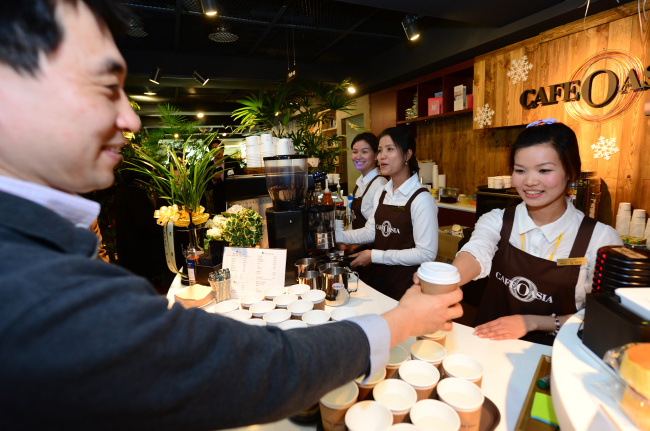On the fourth floor of POSCO’s building in Samseong-dong, southern Seoul, there is a Poreka lounge for POSCO employees. Inside the Poreka lounge sits a green, wooden coffee shop called Caf Oasia.
But this cafe is different from other coffee shops. Opened on Feb. 18, Caf Oasia employs three immigrant women from Cambodia, Thailand and Vietnam as its baristas.
The caf was created through investments from several members of social enterprises. POSCO, the nation’s top steelmaker, leased the space for free and covered the extra expenses. Furthermore, the 10 social enterprises provided group marketing and purchasing for the cafe to help reduce production costs. The name Caf Oasia was coined by Kookmin University students through a talent donation.
But this cafe is different from other coffee shops. Opened on Feb. 18, Caf Oasia employs three immigrant women from Cambodia, Thailand and Vietnam as its baristas.
The caf was created through investments from several members of social enterprises. POSCO, the nation’s top steelmaker, leased the space for free and covered the extra expenses. Furthermore, the 10 social enterprises provided group marketing and purchasing for the cafe to help reduce production costs. The name Caf Oasia was coined by Kookmin University students through a talent donation.

“Since I work here, I have been proud to say I’m a barista, especially to my 7-year-old daughter,” said Van Mali, a 28-year-old immigrant from Cambodia.
Cafe Oasia has been touted as a good model for corporate support for multicultural families as part of POSCO’s social contribution activities. In line with the company’s ongoing efforts to provide support to multicultural families, creating jobs for immigrant women is one of its main goals.
“Financial support to multicultural families is quite common in society, but it usually ends up in onetime financial assistance, so we think it is more important to set the groundwork for them to stand on their own,” said Kim Jin-ju, a manager of POSCO’s corporate communication planning group.
Company CEO Chung Joon-yang, who is co-leader of the Multicultural Families Forum, has made great contributions to the multicultural community.
Since 2011, POSCO has worked with the Danuri Call Center to provide practical help to immigrant women and multicultural families.
Also in 2012, the company signed a memorandum of understanding to promote classes with language-talented immigrant women. Through this collaboration, around 130 immigrant women were hired as instructors of Korean and their native languages.
By Choi In-jeong (injeongchoi@heraldcorp.com)






![[KH Explains] Can tech firms' AI alliances take on Nvidia?](http://res.heraldm.com/phpwas/restmb_idxmake.php?idx=644&simg=/content/image/2024/05/07/20240507050619_0.jpg&u=)


![[Grace Kao, Meera Choi] Has money displaced romance on dates?](http://res.heraldm.com/phpwas/restmb_idxmake.php?idx=644&simg=/content/image/2024/05/06/20240506050233_0.jpg&u=)







![[K-pop’s dilemma] Time, profit pressures work against originality](http://res.heraldm.com/phpwas/restmb_idxmake.php?idx=652&simg=/content/image/2024/05/08/20240508050705_0.jpg&u=20240508171126)
![[Today’s K-pop] NCT Dream to drop pre-release from 2nd Japan single](http://res.heraldm.com/phpwas/restmb_idxmake.php?idx=642&simg=/content/image/2024/05/08/20240508050725_0.jpg&u=)